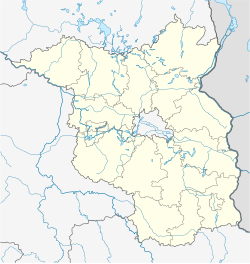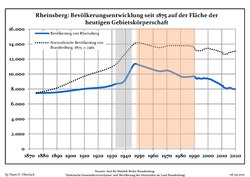|
Rheinsberg
Rheinsberg (German: [ˈʁaɪnsbɛʁk] ) is a town and a municipality in the Ostprignitz-Ruppin district, in Brandenburg, Germany. It is located on lake Grienericksee and the river Rhin, approximately 20 km (12 mi) north-east of Neuruppin and 75 km (47 mi) north-west of Berlin. History Frederick the Great, while still Crown Prince, designed and moved into a restored chateau in Rheinsberg shortly after his 1733 marriage to Elisabeth Christine of Brunswick-Bevern. Here he experienced his "Rheinsberg Period", an era marked by regular correspondence with Voltaire, boisterous celebration in the company of minor philosophers and musicians, and the writing of several works of political theory, including the Anti-Machiavel.[3] Crown Prince Frederick lived in the castle in Rheinsberg with his wife until he became King of Prussia in 1740 upon the death of his father, Frederick William I. He immediately banished his wife to Schönhausen Castle in the district of Berlin that is today called Pankow. King Frederick never visited his Queen and she was not allowed to visit him. She lived alone in her castle in Pankow until her death in 1797. In June 1744, Frederick the Great gave his castle in Rheinsberg to his younger brother, Prince Henry of Prussia. Frederick also gave Prince Henry the great castle on Unter den Linden, which is today Humboldt University. Prince Henry often said that his older brother improperly took credit for a series of military victories. Four years after the death of Frederick the Great in 1786, Prince Henry erected a large obelisk at his castle in Rheinsberg. The obelisk was erected in honor of Prince Henry's younger brother, Prince August Wilhelm. In 1757 King Frederick dismissed his brother Prince August Wilhelm from the army in disgrace after Frederick's humiliating defeat at Kolin in Bohemia. Frederick unjustly blamed his brother of being a coward and incompetens as a military leader. Prince August Wilhelm died the following year. He probably died of meningitis, but many contemporaries, including Prince August's brother Prince Henry, believed that August Wilhelm died because of Frederick's demeaning and humiliating treatment of his brother. On the obelisk, Prince Henry placed 28 medallions honoring a number of prussian generals for military victories that Frederick had falsely claimed as his. On the obelisk, Frederick the Great is not mentioned with one single word. In private correspondence, Prince Henry made no secret of the fact that the obelisk was a criticism of his brother. The obelisk in Rheinsberg can be seen to this day. In 1870, the painter Eduard Gaertner and his family decided to leave the hectic atmosphere of Berlin and settle in Flecken Zechlin, a suburb of Rheinsberg - where he lived until his death in 1877. Rheinsberg is the location for Kurt Tucholsky's Rheinsberg, a 1912 picture book for lovers based on an autobiographical weekend trip. Demography
GeographyLakesPhotogallery
Twin towns
People from Rheinsberg
References
External links
|
|||||||||||||||||||||||||||||||||||||||||||||||||||||||||||||||||||||||||||||||||||||||||||||||||||||||||||||||||||||||||||||












